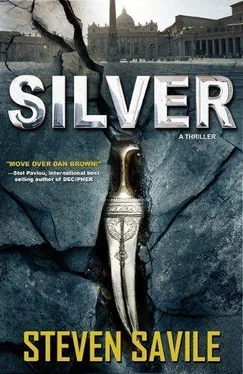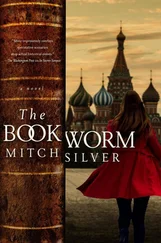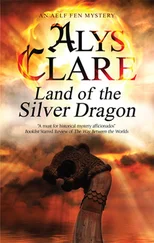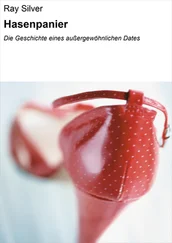Steven Savile - Silver
Здесь есть возможность читать онлайн «Steven Savile - Silver» весь текст электронной книги совершенно бесплатно (целиком полную версию без сокращений). В некоторых случаях можно слушать аудио, скачать через торрент в формате fb2 и присутствует краткое содержание. Жанр: Триллер, на английском языке. Описание произведения, (предисловие) а так же отзывы посетителей доступны на портале библиотеки ЛибКат.
- Название:Silver
- Автор:
- Жанр:
- Год:неизвестен
- ISBN:нет данных
- Рейтинг книги:4 / 5. Голосов: 1
-
Избранное:Добавить в избранное
- Отзывы:
-
Ваша оценка:
- 80
- 1
- 2
- 3
- 4
- 5
Silver: краткое содержание, описание и аннотация
Предлагаем к чтению аннотацию, описание, краткое содержание или предисловие (зависит от того, что написал сам автор книги «Silver»). Если вы не нашли необходимую информацию о книге — напишите в комментариях, мы постараемся отыскать её.
Silver — читать онлайн бесплатно полную книгу (весь текст) целиком
Ниже представлен текст книги, разбитый по страницам. Система сохранения места последней прочитанной страницы, позволяет с удобством читать онлайн бесплатно книгу «Silver», без необходимости каждый раз заново искать на чём Вы остановились. Поставьте закладку, и сможете в любой момент перейти на страницу, на которой закончили чтение.
Интервал:
Закладка:
“So, dagger, why don’t you share this truth of yours, then?”
He did.
They walked a while in silence, Menahem gathering his thoughts. There was a lot he needed to tell, a lot that would have the ring of lies about it, and he needed his brother to believe. For the first time Menahem shared with his younger brother the truth of their grandfather Judas Iscariot. He showed him the thirty Tyrian shekels that were his legacy, and told the true story of the agony of the garden. After all these years protecting the secret, it surprised Menahem how good it felt to unburden himself and to have someone else understand.
“I want you to have the coins,” he finished. “Take them, they are yours.”
Eleazar braced himself against the wall, staring out over the plain. “No,” he said, finally. “If what you say is true, we should use them to honor grandfather, not hide them.”
“And how do you propose we do that?”
Eleazar thought about that for a moment. “We are Sicarii, brother. We are men of the dagger. What better way to preserve his truth than use them to commission the greatest blade ever?”
“Were you listening to anything I said? These coins are cursed. They cannot be spent. Grandfather couldn’t even give them away.”
Eleazar rubbed his thumb and forefinger across the stubble of his chin. He did not have an answer for that. What good were coins that could not be spent? They stood in silence for a few moments longer, until Eleazar grinned. “Humor me a moment,” he sid. “So the coins can’t be used to pay a master weapons smith, but that doesn’t mean the coins themselves can’t be forged into a dagger, does it?”
“A silver dagger?” He thought about it for a moment. There was a certain righteousness to the idea, given that the coins-or rather what they signified-had been one of the major influences behind the founding of the Sicarii. To turn the shekels into a dagger seemed somehow fitting. But silver was such a soft metal, any blade made out of it would be almost useless. But then perhaps a dagger never intended to kill was even more apt a tribute to Judas Iscariot? “Let me think on it.”
He lost the remains of the day in thought. The notion of the dagger appealed to him, so he had Eleazar light the forge fire and promised he would join him soon.
His mind refused to rest. All he could think about was tomorrow and tomorrow and tomorrow. It promised to be the defining dawn in the dagger men’s struggle. The harridan’s curse gnawed away at the back of his mind. In killing the priest had he damned them all? No. He refused to believe that. The plan was good. He had gone over it a thousand times. It was simple-misdirection, subterfuge and bloodshed.
Come first light the Sicarii would hit Jerusalem’s supply lines. They would burn the fields and slaughter the cattle. Without food the city would collapse in a matter of days, forcing the people to turn on the besieging Romans. There would be no more weak men out there trying to negotiate peace for the hungry. They would be out there on the streets with one thought: food. That was the shadow play. It turned the eyes away from what they were really doing, and allowed the dagger men to disappear into the ghettos. Once they found the shadows they would be able to orchestrate the true rebellion from the streets, striking only to fade away before the dying was done. Again and again, like vipers, they would attack, sinking their steel teeth into the pilgrims as they shuffled toward the Temple Mount looking for salvation, hitting the priests and the soldiers and leaving them clawing at the dust as they bled out into the road. And they wouldn’t stop until every last Herodian and Roman sycophant was either dead or driven from the city, leaving Jerusalem for the Jews.
It would be glorious. Righteous. More, it would be a fitting memorial for both his father and his grandfather, and would mean even more souls to join them wherever they were now. He refused to think of heaven or some beneficent Maker tending to the spirits of the dead. In Menahem’s mind the afterlife was a place of torment and suffering, Gehenna, with the gates of teshuvah firmly closed. How could it be anything else, built as it was on lies? There was no caring Christian God, no everlasting life in Olam Habah. The only deity he believed in was vengeful, the one who brought the flood to purify his creation, who demanded Abraham murder his own son to prove his fidelity. That was the god who owned the afterlife, the god capable of imagining such hells as the great fiery lake that existed solely to burn the sinners.
And that was a god he could kill for.
Menahem stopped his pacing. The red sun was a fiery glow behind the mountains in the middle distance. This land was his land. He felt a fierce attachment to it. When he died he wanted his blood drained and poured into the dirt so that he could become one with it. Was the woman right? Would he join them in Gehenna tomorrow? Was that his fate? Curiously the thought didn’t frighten him. It wasn’t that he hadn’t resigned himself to dying, more that he was at peace with it. He would leave the world a better place for his people than it was when he had entered it. That was all any man could ask of his life.
Menahem disappeared into one of the dark tower doors that led out of the sun. His footsteps echoed as he rushed down the spiral stair. The air was different, older. It was so much colder than outside, his scalp prickled and his skin crawled. It was only a few years since they had taken Masada by force. The blood of the Romans still stained the sandstone where it had been spilled. It leant the stairs a second set of shadows. How many ghosts still walked the walls? How many death rattles did the old stones remember?
At the bottom of the stairway the passage opened up into an antechamber. Like much of the fortress, the room was devoid of any decoration. There was an archway, lit by flickering torchlight. A draft blew through from outside. Beyond the arch three doors led off into other rooms. Another stair led down deeper to what had been the Romans’ dungeon, and a passage led toward the courtyard. Menahem followed the passage. The torches in two of the sconces had burned out, leaving dark shadows in their place. The passageway curved slightly, following the contours of the mesa. Around the corner, the passage branched into a second one, which in turn led out to the courtyard.
The heat hit him immediately. The temple stood in the shade of Herod’s three-tiered, round palace. When they had taken the fortress they had stripped it of much of its luxury. The bath house had fallen into disuse. The huge palace itself served as barracks for the assassins. Menahem hurried across the courtyard. Like Herod’s great temple in Jerusalem, this one had a variety of entrances. Even here the servants could not worship their Lord side by side with their masters. There was a door for the women, a door for the first-born sons, a door for the priests with their offerings and a door for the commoners. The Sicarii had stripped the temple of all religious trappings and turned it into a sheep croft for no other reason than it amused them.
He pushed open the temple door and went inside.
The air was hot. Uncomfortably so. And it stank of animals. Eleazar had brushed the straw away from around the altar. Behind it sandstone bricks had been built up around a wooden fire to trap the heat. The wood had already burned down to charcoal. His brother was hunched over the fire, feeding it.
Eleazar was the Sicarii smith-the dagger men’s dagger maker. He moved with quiet economy, every movement precisely measured. He didn’t look up as his brother entered. Menahem saw he had made a crude sand cast to pour the molten silver into. It would give the dagger its basic shape. The smith’s hammer lay on the altar. On the floor beside the altar was a bucket of luke-warm water.
Читать дальшеИнтервал:
Закладка:
Похожие книги на «Silver»
Представляем Вашему вниманию похожие книги на «Silver» списком для выбора. Мы отобрали схожую по названию и смыслу литературу в надежде предоставить читателям больше вариантов отыскать новые, интересные, ещё непрочитанные произведения.
Обсуждение, отзывы о книге «Silver» и просто собственные мнения читателей. Оставьте ваши комментарии, напишите, что Вы думаете о произведении, его смысле или главных героях. Укажите что конкретно понравилось, а что нет, и почему Вы так считаете.












